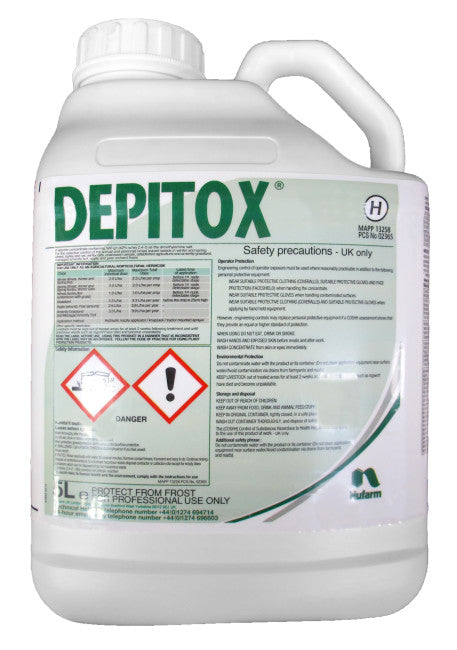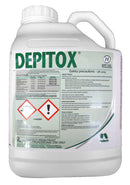Description
| Type of Product | Herbicide |
|---|---|
| Product Name | Depitox 500 |
| MAPP No. | 17597 |
| Active Substance | 500 g/l 2,4-D |
| Formulation Type | Soluble concentrate |
| Areas of Use | Amenity grassland, grassland and managed amenity turf |
| Amateur/Professional | Professional |
| Phytomobility | Systemic penetrant |
| Mode of Action Group | Synthetic auxins |
Depitox 500
MAPP no. 17597
Active Substances: 500 g/l 2,4-D
Depitox is a selective herbicide for the control of many broad-leaved weeds including Ragwort in managed amenity turf and amenity grassland situations, such as golf courses, playing fields, roadside verges and ornamental lawns.
Control of ragwort weed is best achieved when the plant is in the rosette stage.
Instructions for use
Where to use:
- Amenity grassland - Areas of semi-natural or planted grassland subject to minimal or non-intensive management including airfields and predominantly grassed railway embankments and roadside verges.
- Grassland - Short and long-term grass leys and permanent pasture, which may be grazed and /or cut for subsequent animal consumption. Includes use on newly sown leys and moorland for grazing
- Managed amenity turf - Areas of frequently mown, (i.e. mown at least one a week) intensively managed turf, including fields being used for turf production. May include areas for public use including all types of sports turf, golf greens, tees and fairways.
When to use:
Apply to actively growing grass (normally between April to September) that has been established for a minimum of 12 months.
- Annual weeds are more susceptible at the seedling stage
- Perennial weeds are more susceptible when the flower bud is forming
| Application Window - Depitox 500 | |||||||||||
|---|---|---|---|---|---|---|---|---|---|---|---|
| Jan | Feb | Mar | Apr | May | Jun | Jul | Aug | Sep | Oct | Nov | Dec |
How to use:
- Apply at a rate of 2.8 - 3.3 l/ha in 100 - 1000 l/ha water to amenity grassland, grassland or managed amenity turf
- Apply using vehicle mounted or handheld spray equipment using a medium spray quality nozzle
- Top dressing ten days before treatment will assist with weed control and subsequent recovery of the sward
| Crops | Maximum treatments | Application method | Application rate | Water volume | Spray quality |
|---|---|---|---|---|---|
| Grassland | 1 per year | Vehicle mounted or handheld equipment |
2.8 - 3.3 l/ha | 100 - 1000 l/ha | Medium |
| Amenity grassland | 3 per year | ||||
| Managed amenity turf |
Additional information:
- Livestock must be kept out of treated areas for at least 2 weeks following treatment and if ragwort is present, until there is no visible sign of the dead weed
- Do not apply during rain or if rain is expected
- Do not mow, roll or harrow for four days before or after application
- Do not apply immediately before or after sowing any crop
- The first four mowings after treatment must be composted for at least six months before use
- Do not apply to crops which are suffering from stresses
- Avoid contact with non-target plants
Active substances
2,4-D
Bio-Chemical Mode of Action: 2,4-D belongs to the synthetic auxins group of herbicides.
Synthetic auxins work by inducing rapid abnormal cell growth and development in the stems, petioles and leaves of susceptible plants causing cell bursts and ultimately cell and plant death.
Mobility: 2,4-D is a systemic penetrant which means that the active substance can be translocated downwards through the plant within the phloem (sugar conducting tissues) and upwards through the plant within the xylem (water conducting tissues).
Application timing: Systemic auxins are best applied when the weeds are actively growing. They are generally more effective when target plants are younger and in their vegetative phases.
Resistance: The incidences of resistance to synthetic auxins remains relatively low which is assumed to be because the herbicide has multiple sites of action.
However, resistance to synthetic auxins has been observed globally with 36 species being confirmed as resistant as of 2017. Best management practices, such as alternating with products with a different mode of action and using cultural weed control methods, will help to reduce the risk of further resistance.
For further information on Depitox 500, please contact a member of our technical sales team on 01902 440280.
Technical Information
Product Label
SKU - 196351
Safety Data Sheet
SKU - 196351
Delivery and Returns
Delivery charge (if applicable) applied at checkout. Next working day delivery is available on some products, as an option on orders placed before 1pm - excludes festive season & bank holidays. Please note deliveries to Highlands, Cornwall and more remote areas may take longer. Surcharges apply for non mainland locations, call for more information - More delivery information.
For large orders, please be aware that if you require a smaller 7.5 tonne lorry, the maximum weight for pallets is 750 kg - otherwise the standard pallet size limit of 1000 kg applies.
If you have any access restrictions for lorries or large vehicles please speak to our sales team on +44 (0)1902 440250.
Collection from our Telford, Shropshire, Trade Counter is available for this product - More collections information.
Safe use of pesticides
The purchaser and/or end users are responsible for ensuring that these products are used in line with industry Approved Codes of Practice. All operators must be trained and certificated in using and applying any Ministry Approved professional product.
Please be aware that by proceeding you are purchasing a professional pesticide product.
You must ensure the end user of these products complies with the DEFRA/HSE Code for the Safe use of Pesticides:
"By law, everyone who uses pesticides professionally must have received adequate training in using pesticides safely and be skilled in the job they are carrying out."





